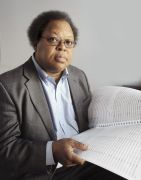Dana Reason of the Agosto Foundation interviewed composer, musicologist and improviser George Lewis in his Columbia University office in New York in December 2013.
You have been in New York City at Columbia for a while and we’re curious about what you’ve been doing. Could you tell us about what you’ve been working on?
GL: One project is the two-volume Oxford Handbook of Critical Improvisation Studies, co-edited with Benjamin Piekut, who’s at Cornell University. I’m calling it “massively interdisciplinary.” That is to say, it’s not primarily musical. A number of our authors are writing from political science or anthropology, literary studies. There are philosophers, theater people, others working outside of musical domains – new media theorists, neuroscientists, economists. Many of them do take music as an important way of thinking about improvisation, but then they add value to the way that musicians can think about other fields. We had to think hard about what the field is like today, and if we wanted to see a field of critical improvisation studies and what it would be about. Improvisation becomes for us a mode of being in the world, something that is constitutive of what it means to be a human being.
How do you suppose that this collection will change perceptions about what the nature of improvisation is?
GL: Well the first thing that it does – and this is from the standpoint of creating a field — it allows scholars and artists who want to be associated with the field of improvisation a source of legitimation — a lever and a place to stand, so to speak, in the Archimedean sense. So I used to joke that some young assistant professor who was interviewing for a job can just carry these volumes with them. And they’d say, “Well, what are you doing, you want to study improvisation, what’s that?” And they’d plop these huge volumes, twelve hundred pages, sixty authors, on the desk and say, “Well, this is what it is.”
How do you suppose that this knowledge will shift other disciplines and ways of thinking?
GL: I think that it becomes inevitable. We’ve seen quite a bit of it already. We’ve been able to question a lot of the eternal verities surrounding the way people think about improvisation; for example, that it’s always in the moment – it isn’t. It can take place over really long time scales. For example we were looking at Paul Richards’s work on farming by indigenous people in Sierra Leone and the processes that take place over very long time scales — at least a year to work with seeds, to work with technologies of what they call shifting cultivation. So these things are improvisations that do happen in the moment, at the moment they’re working. But then there’s this long-term sense of working with the environment. There are real consequences to what happens in the improvisation that can result in starvation for you and your family and your community if you don’t get something done. And then you’re dealing with circumstances that can’t be controlled, it’s not the environment of a club or a concert hall, or a loft, or a performance space, or a gallery, any of those spaces — the ubiquity of spaces in which music takes place. It’s the world of weather, the world of soil, the world of war. This is something that even someone like John Cage didn’t really take into account. “There is an implicit fear of improvisation — of it being out of control, unwieldy, unstructured.”
